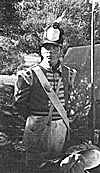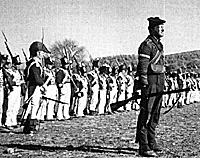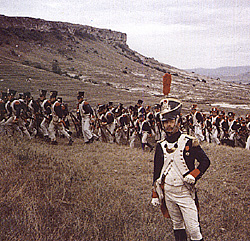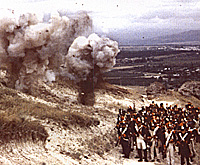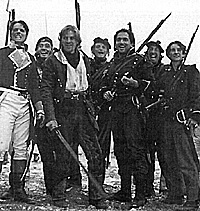 Sharpe was a completely new concept for television back in 1992, when an attempt was made to shoot three episodes based on the best-sellers by Bernard Cornwell in the Southern Crimea, with a tight budget, the building of large sets, voluminous costuming, weapons and all the associated logistics to support them.
Sharpe was a completely new concept for television back in 1992, when an attempt was made to shoot three episodes based on the best-sellers by Bernard Cornwell in the Southern Crimea, with a tight budget, the building of large sets, voluminous costuming, weapons and all the associated logistics to support them.
Since that attempt another two series have been filmed, the third to be shown on Central TV from May 1995. Shot around and on the battlefields of the Crimean War of 1854/5, what did the actors think about it all?
Were they in 1995 hardened to the campaigns of 1812-13?
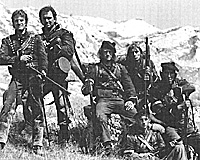 Daragh O’Malley - “Harper”
Daragh O’Malley - “Harper”
Daragh O’Malley plays Sergeant Patrick Harper. What does he think Harper’s attitude to his army service would be?
“Harper respects the institution that is the British Army but is indifferent to it at best... he has no prospects of ever rising from the ranks and whilst he deems that a little unfair he is not that interested anyway, he knows he does a good job and is proud that he has the ability to do just that... you must remember that in the early 1800’s the British Army were very active in Ireland, killing at random, gang-raping women at every opportunity, changing and anglicising every name of every Irish town, preventing the practice of the Catholic religion and killing and hanging anybody who dared speak the Irish language... Harper’s position is uncomfortable as a result but he dreams of a time when he can do his bit back home... he is Irish, for ----- sake, and very complex!”
What then would Harper be fighting for?
“Harper like most of the rank and file of the British Army, has no idea of the hidden agenda formulated at Horse Guards. He ‘fights’ to stay alive... to reach tomorrow, and to keep his great friend Richard Sharpe alive so that he can go on to use his honesty and integrity and working-class morality to make a ‘difference’!”
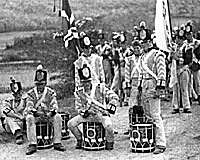 John Tams - “Hagman”
John Tams - “Hagman”
John Tams, actor and musician, plays Rifleman Daniel Hagman. What appealed to him about playing the part of a Napoleonic soldier. “I can relate easily to a ruralist poacher; and also to the ‘know-your-place-on-the-estate’ manner in which the regiments of the British Army seemed to have been arranged; the Colonel being the squire at the top, and me right down at the bottom! The hand-to-hand combat aspect was tricky - both me and Hagman agree that a result should be obtained before coming to blows which could damage your beloved Rifle! Hagman in the novels also enjoys a certain amount of freedom and laxity in drills I try to build on that in the films as Hagman is obviously the more mature and sensible of the Chosen Men and enjoys a particular relationship to Sharpe based on mutual trust.”
Has his knowledge of period music been a help?
“Yes, I learned a lot about the potential repertoire of Hagman. Music was often the only culture available to soldiers, being illiterate and far from home; it carried in those days a great power as a means to appeal to the senses and emotions - it is a tool to Hagman in as much as his rifle is his weapon,”
Would he have liked to march with Wellington’s Army?
“Perhaps I wouldn’t have had the fortitude or stamina required - they were iron men - and the spiritual and physical privations would have required great character to conqure... but I can understand a man like Hagman; country bred, independent, solitary; he might fly to the army to avoid wedlock or punishment in the social and economic climate of England at that time. He is an unnatural soldier, but a good survivalist who can be self-sufficient”.
John Tams shares one aspect with Hagman off and on-screen. his well-aimed laconic wit often sends barbs flying straight to the bulls-eye reducing both cast and crew to helpless laughter.
Jason Salkey - “Rifleman Harris”
 Jason Salkey, the ‘Rifleman Harris’ of the series is a keen athlete and sportsman. What does he think of the soldiers who fought in the Peninsula War?
Jason Salkey, the ‘Rifleman Harris’ of the series is a keen athlete and sportsman. What does he think of the soldiers who fought in the Peninsula War?
“ They definitely got their shillings’ worth out of the soldiers then - I imagine a present day infantryman gets far more training and is treated as a lot more than cannon fodder. Obviously the concept of honour has run deep in (and especially in the British Army) soldiers through the ages. Nowadays the interference of politicians and public opinion is more immediate - in those days war could be more pure, less ulterior and therefore governed with Honour. I feel the soldiers in the Peninsula War must have been bonkers and fuelled on alcohol.., but I love the stories of outlying pickets on both sides sharing booze, tobacco or food.”
Has serving as Harris heightened his interest in military history at all?
“When I got the part of Harris I read the first two books in the series. The part of Harris does not make an appearance so I had no preconceived notions of how to portray him. The academic fighting soldier is almost a walking contradiction and I wasn’t sure which of the elements to stress, the brain or the brawn. In the end I hope he hasn’t come over as Bamber Gasgoinge meets Rambo - but as a believable and entertaining character.”
Will he then be penning his own “Recollections of Rifleman Harris”?
I have an interest in military history and it’s place in world history. I think WW2 and Vietnam are the subjects I studied most before Sharpe - I wasn’t sure the Peninsula War was part of the Napoleonic Wars - since then I’ve plundered Foyle’s for many a book on Riflemen and the general history of warfare during this period. Also being in the Crimea has led me to take an interest in that campaign, reading “The Reason Why” and going out on one of Richard Moore’s Battlefield Tours there.
I would like one day to become skilled enough to write a book. I’ve kept a journal of the last three series of Sharpe and tried to style it a little along the lines of “Recollections” - the journal takes the form of the original Harris but doesn’t spend a lot of time explaining the historical fabric of the scenes we film. I think my book would deal with what a ‘soldier in the war of shooting “Sharpe, the Series” has had to put up with to get through the campaign. But, all Sharpe fans hear this: if I do publish the journal, get it and read it - it should be a right riveting read!”
“Rifleman Moore”
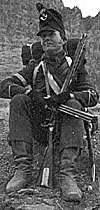 Richard Moore; quiet, patient but persistent; served as Military and Technical Adviser on the series and also made or designed most of the practical personal weapons used by the principal actors on ‘Sharpe’. From where did he draw his inspiration?
Richard Moore; quiet, patient but persistent; served as Military and Technical Adviser on the series and also made or designed most of the practical personal weapons used by the principal actors on ‘Sharpe’. From where did he draw his inspiration?
“Twenty years as a re-enactor; the Regulations governing the period; and sticking to the novels - after all, their success is why we’re here. When I place a gun or a sword into an actor’s hands it is as close as possible to the original - I then show the actor how to get the best from it. The volley-gun was a real challenge, as was Leroux’s sword - both these weapons had to look good but be practical too - the ‘Sharpe’ sword I designed and made to beat the Leroux Kligenthal is one of the best things I ever made - a truly magnificent weapon.”
Do the weapons survive the films?
(This question brings a wry grin to his face) “0n the whole yes - but as they say “you can’t make an omelette without breaking eggs” - the damage bill to weapons and uniforms is enormous, but - it is war, and the battle scenes’ we shoot are shot as close as possible and as furious as we can make them. It all costs on materials. The bodies can heal themselves, in time.”
Have there been many injuries then?
“Yes, a few. The rocket sequences from “Enemy” left burns; the Storming of Badajoz gave a few fractures and a lot of bruises; Sean Bean picks up grazes from the sword fights and the shellfire at Vitoria left me with stitches and a concussion. But, we film as safely as we can - when you deal with powerful explosions, guns and swords; you must expect a few accidents. We just keep them to an absolute minimum.”
Do you appear in ‘Sharpe’?
“Look out for Rifleman Moore - he is real. My many other parts are just walk-ons or voice-overs . But Moore is unique because he is genuine... he marches, he loads and fires, shivers and sweats. He is the sum of it all - he’s been everywhere, done everything, and he is the one you never notice - the ordinary soldier doing his duty.”
What do you remember most?
“Wellington. We have had two excellent “Wellington’s”. David Troughton was very good in ‘1809’ and Hugh Frazer equally so in ‘1812’. I feel like I met the man.”
Do you receive any fan-mail?
“Ha-ha! Not enough! Most of the mail is very complimentary. We have to make Sharpe for an audience of millions world-wide but we always consider the period military enthusiasts. We do the best we can for them under the given circumstances.”
Richard, a leading exponent in practical living history, gives to ‘Sharpe’ much of the sense of the period in terms of military terminology, actions and dialogue. Rarely out of his Rifleman’s uniform, his attempt;: to ‘lead from the front’ by playing the part permanently during filming gained him accolades from cast and crew alike, and he used his spare time to experiment in the hazards of campaign life from a Napoleonic soldiers’ point of view. What now for ‘Rifleman Moore’?
“After ‘Sharpe’s Battle’ you will have to wait and see...
Sean Bean - “Sharpe”
 Sean Bean plays the soldier risen from the ranks, becoming Major of the Prince Of Wales’ Own Volunteers, Richard Sharpe, Sean comes from Sheffield and after the success of the first “Sharpe” has made the part his own, with his photo on the front of all the reprinted paperback adventures from Collins Books. And now, from May 1995, comes a new book, “Sharpe’s Battle” set in the turmoil of the battle at Fuentes D’Onoro.
Sean Bean plays the soldier risen from the ranks, becoming Major of the Prince Of Wales’ Own Volunteers, Richard Sharpe, Sean comes from Sheffield and after the success of the first “Sharpe” has made the part his own, with his photo on the front of all the reprinted paperback adventures from Collins Books. And now, from May 1995, comes a new book, “Sharpe’s Battle” set in the turmoil of the battle at Fuentes D’Onoro.
“Bernard Cornwell wrote the book for me which we filmed as part of the third series. It is very flattering to have a book written especially for you by the man who originally created Sharpe, it has been very nice over the past three years to make the part my own.”
“In the third series, Sharpe has to come to terms with the loss of his wife, Teresa Moreno, shot by Obahdiah Hakeswill in “Enemy”. “There are some obvious moments when her memory stirs him and even catches him unawares.”
Where does Sean think Sharpe’s success comes from ?
“Sharpe is a believable hero because he makes mistakes but he has the heart of a lion and firm values and things that he stands up for, it is also great Boys’ Own stuff - it must be every man’s dream to lead a body of men against the ‘French’ and storm a huge fortress in the face of all odds.”
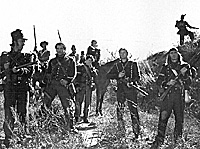 Does he enjoy the action ?
Does he enjoy the action ?
“It is an important part of the film to make the fights rook good so we work them out with the director so that they feel as natural as possible.”
Sean had tuition in the Crimea from a Russian Olympic standard fencer for the sword fights, As the actors all use authentic weapons, they have to be watched very carefully, and spend a lot of time rehearsing, In the fight with Lord Kiely in “Battle”
Sean felt the fight was ‘too clean’, and resorted to tactics of his own, which is what you see in the film. “The girls like me to play the hero and they don’t like anyone that gives me a bashing!”
Sean goes off from his present filming to take the part of 006 in the next James Bond film, Goldeneye.
| Sharpe's Enemy
| Sharpe's Battle
|
| Posing for War
| French Grenadiers
|
Back to Table of Contents -- First Empire #23
Back to First Empire List of Issues
Back to MagWeb Master Magazine List
© Copyright 1997 by First Empire.
This article appears in MagWeb (Magazine Web) on the Internet World Wide Web. Other military history articles and gaming articles are available at http://www.magweb.com
